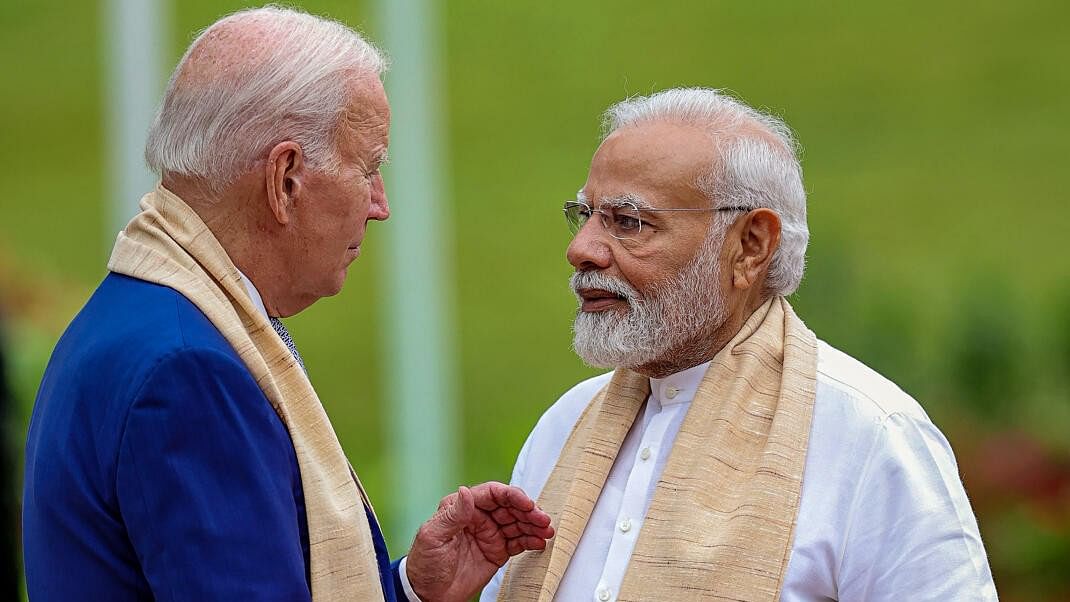
Prime Minister Narendra Modi with US President Joe Biden
Credit: PTI Photo
The United States has offered advice to Prime Minister Narendra Modi to exclude aggressive references to Pakistan from his election rhetoric. Instead, it has suggested that India should find a resolution through dialogue with Pakistan, without escalating the issue.
The US reaction came after Modi and his Defence Minister Rajnath Singh publicly boasted that India under the current regime is assassinating terrorists “in their homes”, even by crossing borders.
On April 11, in a political rally in Uttarakhand’s Rishikesh, Modi declared, “Whenever we have had a weak government in the country, our enemies have taken advantage. Under this strong government, atankwaadiyon ko ghar mein ghus ke mara jata hai (our forces are killing terrorists on their own turf)."
Five days earlier, on April 6, Singh in an interview with a TV channel, named Pakistan specifically when he claimed, “If any terrorist tries to disturb the country’s peace, we will give a befitting reply. If they (terrorists) run to Pakistan, we will go there and kill them (Pakistan mein ghus kar marenge).”
Singh’s statement came on the same day that the external affairs ministry denied a report in The Guardian, implicating India in cross-border assassinations in Pakistan. The report quoting anonymous intelligence operatives in India and Pakistan claimed that at least 20 terrorists wanted by India had been shot dead in Pakistan “as part of a wider strategy to eliminate terrorists living on foreign soil.” India denied the charge, describing the report as “false and malicious anti-India propaganda.”
It is against this background that a Pakistani journalist asked State Department Spokesperson Mathew Miller on April 16: “Sir, Indian Prime Minister Modi and his defense minister has said – have said in a campaign speech that the new India will not hesitate to cross borders to kill terrorists. They are kind of confessing to the assassination of (Hardeep Singh) Nijjar in Canada, (Gurpatwant Singh) Pannun’s murder-to-hire (sic) plot in New York, and killings in Pakistan. Is this statement a concern for the Biden administration?”
Miller replied that while the US did not want to get into “the middle of this”, but the US encouraged “both India and Pakistan to avoid escalation and find a resolution through dialogue.”
Those familiar with the US State Department’s daily briefings would know that journalists are often primed to ask specific questions so that the administration can signal its stance on a particular global issue. Usually, the spokesman has a written answer ready for such questions.
Although one cannot say whether this was a planted question, Miller had his reply ready not only for this question but also for its follow-up.
The Pakistani journalist pressed Miller further by asking, “Sir, in the past, the United States has imposed sanctions on individuals from foreign countries involved in assassination attempts here in the United States. But we don’t see similar actions against India. What is the reason for this apparent relaxation?” Miller replied that he was not “going to preview any sanctions actions, which is not to say that there are any coming” and clarified that the US did not discuss such things openly.
This was played up in some sections of the Indian media as the US indication that it will not meddle in India’s alleged assassination of terrorists abroad, and that the US had thereby “snubbed” the Pakistani journalist. It was anything but a snub.
It is significant, however, that the State Department's statement on overseas assassinations came two days after, on April 16, when one Amir Sarfaraz aka Tamba of the Lashkar-e-Taiba, was shot dead by ‘two unknown men’ on a motorcycle in Lahore on April 14. Pakistan blamed India for the killing.
Tamba was the alleged killer of Sarabjit Singh, an Indian citizen who was accused of a terrorist bomb blast in Pakistan which led to the death of 14 persons. He was awarded the death sentence. While demands were being made for his release, he was killed in jail. The unexpected murder was seen by Indian observers as ‘retaliation’ for the hanging of Afzal Guru in the Parliament bomb blast case.
The US hand was perhaps forced by the assassination of Tamba taking place soon after the statements of Rajnath Singh and Modi flaunting India’s muscular approach to terrorism. It was a signal of disapproval. It was also a message to Pakistan that the US was watching over the situation. A direct admonition to New Delhi, if any, would probably have been offered out of the public eye.
It is clear the US recognises that Modi’s keenness to celebrate cross-border assassination is an image booster, to garner votes. This narrative paid him and his party rich dividends in the 2019 general elections.
The same narrative is being revived once again as India moves towards the polling booths. How important it will be in the campaign of the Bharatiya Janata Party (BJP) will become apparent as voting progresses over the next 40-odd days.
It is clear as of now, that such hyperbole is unlikely to go well with India’s friends abroad, especially the US. The unenviable task of reassuring the international community has been left to the Ministry of External Affairs, whose bland denials carry little credibility because they are contradicted by the prime minister and defence minister in their election speeches.
Foreign Minister S Jaishankar faces the unenviable task of assuaging a worried world community by claiming that targeted assassinations were “not a policy of Government of India”.
Bharat Bhushan is a Delhi-based journalist.
Disclaimer: The views expressed above are the author's own. They do not necessarily reflect the views of DH.